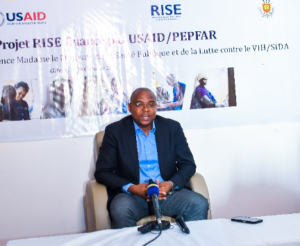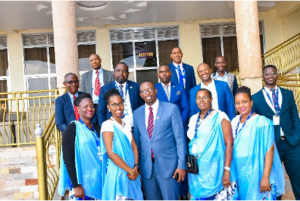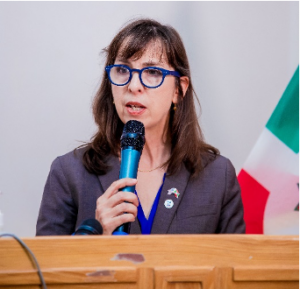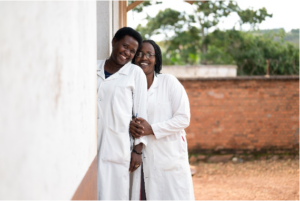
After five years, the Reaching Impact, Saturation, and Epidemic Control (RISE) program in Burundi has ended, leaving behind a legacy of person-centered HIV prevention, care, and treatment.

Supported by the U.S. President’s Emergency Plan for AIDS Relief (PEPFAR) through the U.S. Agency for International Development (USAID), RISE-Burundi was implemented by ICAP at Columbia University. To celebrate its lasting achievements, RISE-Burundi hosted a close-out event in the central Burundian province of Gitega on October 10, 2024. It was attended by representatives from the Ministry of Health, U.S. government, office of the governor of Gitega, RISE-Burundi program leaders, recipients of care, and others.
From 2019 to 2024, RISE-Burundi supported 188 health facilities across 25 districts to reach the UNAIDS 95-95-95 targets. A primary objective of the RISE-Burundi program was to address disparities in the HIV care cascade among specific provinces and populations and to support HIV testing, prevention, care, and treatment among priority populations in target districts. The program implemented a person-centered approach to achieve those goals, ensuring HIV prevention, care, and treatment services were tailored to the individual.
At the close-out event, Aimé Ndayizeye, director of Burundi’s National HIV/AIDS program (PNLS), remarked that this approach and others helped the country to reach major milestones toward HIV epidemic control.
“Thanks to this project, studies carried out in 2023 showed that Burundi was the first francophone African country to achieve sustainable control of the epidemic and the UNAIDS 95-95-95 targets,” Ndayizeye said in his remarks. “At this time, 93 percent of people living with HIV know their HIV status, 99 percent of people who know their HIV status are on antiretroviral treatment, and 95 percent of people on antiretroviral treatment have a suppressed viral load.”

“Through PEPFAR and USAID’s investments in the RISE project in Burundi, ICAP has contributed enormously to treatment linkage,” added Bonaparte Nijirazana, Chief of Party for RISE-Burundi and Country Director of ICAP in Burundi in his opening remarks. “Currently, 99 percent of people who test HIV-positive are directly linked to treatment. Through RISE, ICAP has contributed to accessibility to viral load services, where currently 96 percent of patients have benefited from viral load testing with viral load suppression up to 98 percent.”
Lisa Peterson, U.S. Ambassador to Burundi, remarked that RISE-Burundi significantly strengthened HIV prevention, care, and treatment services to reach the most vulnerable populations in the provinces of Kayanza, Muyinga, Ngozi, Kirundo, Ruyigi, Cankuzo, Gitega, and Karusi.

The success of the RISE project is a testament to the power of partnership at all levels,” said Ambassador Peterson in her opening remarks. “With an investment of $15 million, this initiative has not only delivered essential services to the most vulnerable populations, but also fostered close collaboration with the Government of Burundi, civil society, local communities, and our program beneficiaries by aligning with national strategies and working closely at the national and provincial levels. RISE has strengthened local ownership and laid a strong foundation for future efforts.”
Over the course of the program, RISE-Burundi achieved major progress in the areas of HIV testing and prevention, HIV care and treatment, and viral load suppression, including:
- Between October 2019 and June 2024, a total of 9,610 people living with HIV were newly diagnosed with HIV at RISE-supported health facilities, including 61 percent (5,890) identified through index testing.
- From October 2019 to June 2024, 1,720 individuals across all 188 RISE-supported health facilities started pre-exposure prophylaxis.
- By June 2024, 80 percent of adults and 46 percent of children under 15 at RISE-supported health facilities had been enrolled in six-month dispensing of their antiretroviral therapy (ART).
- By 2024, 97 percent of recipients of care at RISE-supported health facilities had initiated ART the same day they were diagnosed with HIV and at least 98 percent initiated ART within one week of diagnosis.
- By the end of 2023, rates of viral suppression among children, adolescents, and pregnant and breastfeeding women had reached 92 percent, 95 percent, and 97 percent, respectively.

Beyond HIV prevention, care, and treatment progress, at the heart of RISE-Burundi’s long-term success will be the health workers and community relays who supported recipients of care and those at risk of HIV acquisition in reaching and sustaining HIV services. For example, RISE-Burundi engaged mentor mothers and peer educators—women and youth who support people living with HIV through their health journeys—to support community HIV case finding and testing efforts and to make it easier for recipients of care to access treatment, often by delivering medication directly to their home or through support groups. RISE also mentored health care providers in a range of essential areas, such as identifying recipients of care due for viral load testing, counseling index clients, and assessing risks for intimate partner violence among recipients of care.

As RISE-Burundi comes to a close, its legacy will live on through the recipients of care, health workers, and community workers that were impacted by its support, but also through PEPFAR’s and USAID’s continued investment in Burundi’s HIV response through the USAID Baho Mbeho project (which means “You live, I live”). USAID Baho Mbeho is an HIV care and treatment program implemented by ICAP that facilitates a person-centered approach similar to RISE’s approach.
“Under ICAP’s leadership, this project will expand HIV services across all provinces in Burundi so that no one is left behind,” said Ambassador Peterson at the RISE-Burundi close-out event, highlighting the importance of the USAID Baho Mbeho program. “This transition will ensure continuity of HIV services for Burundians while advancing shared goals to achieve epidemic control.”
Read More
To explore the full range of RISE-Burundi’s impact and program approaches, please read the program close-out report, made available in both English and French.



